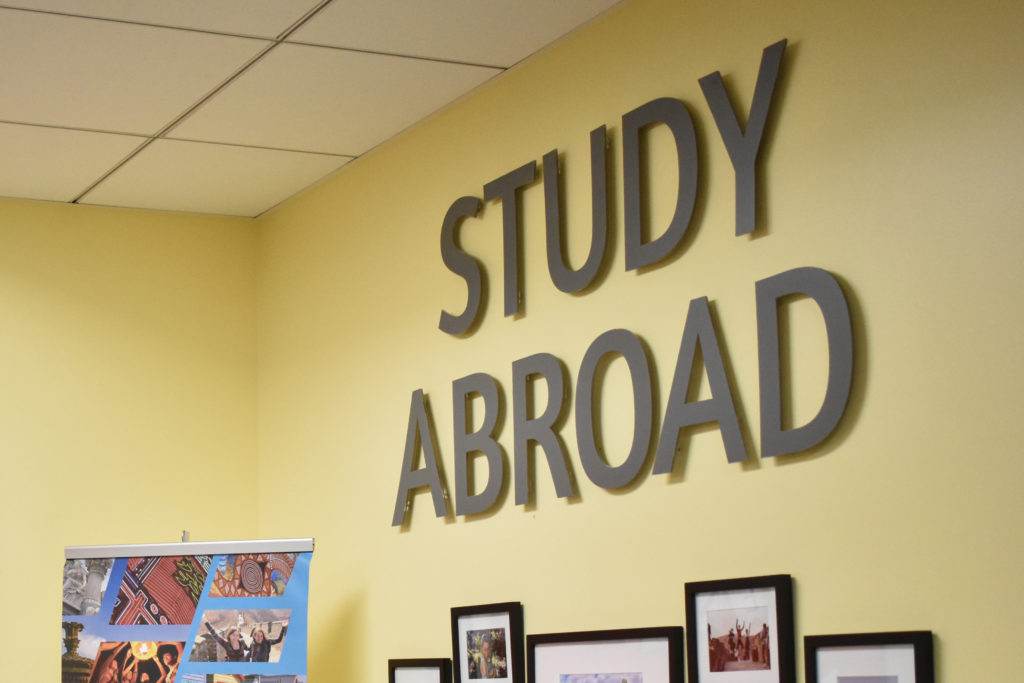Five years after it launched, officials said the Global Bachelor’s Program has allowed students to travel to “less traditional” study abroad locations and spend more time outside the United States compared to most abroad programs.
The program, which has been on hold due to the COVID-19 pandemic, allows undergraduates in the Columbian College of Arts and Sciences, Elliott School of International Affairs and the School of Business to spend three semesters abroad. Daniel Riley, the program manager for the Global Bachelor’s Program, said more than 175 students have enrolled in the program since it was first launched.
He said in the past five years, officials have added an additional site for students to travel to Belfast, Northern Ireland, and have seen an increase in the number of business school and CCAS students participating in the program. Riley said the program has allowed students to obtain a broader set of experiences and skills as undergraduates by exposing them to multiple cultures.
“The first years of the program saw very high preponderance of program participants from the Elliott School,” Riley said in an email. “However, since 2018, numbers in both GWSB and CCAS have grown considerably, giving much more parity between the constituent colleges.”
The program requires students to travel to three different abroad destinations – either Shanghai or Belfast for the first destination and their choice of two of the approved locations for the second and third destinations, the program’s website states. Riley said when the program started, officials focused on encouraging students to study abroad in “less traditional destinations,” like Ecuador, Russia and Tanzania.
Riley said officials’ “top priority” is to resume the program for the upcoming academic year. He said officials temporarily waived the third destination requirement for the students who were unable to travel due to the pandemic, allowing them to complete it with either two semesters of study abroad or a mix of a semester studying abroad and an international internship.
“Some students have completed international internships remotely from the U.S.,” Riley said. “The Global Bachelor’s team has offered a great deal of flexibility, allowing students to be creative in setting up these opportunities.”
Riley said officials in the program have a long-term goal to establish a STEM track for those who have more difficulty studying abroad because of the requirements of their major.
“Students in STEM fields often lack study-abroad options in general, so creating a STEM GBP track would offer a notable expansion in study abroad opportunities for these majors,” Riley said.
Steve Suranovic, a professor of economics and international affairs, said he has been accompanying students in the program to Shanghai for the past five years. He said the program has allowed students to step outside their comfort zone and build character since they have the opportunity to learn how to deal with cultural differences in foreign countries.
“The initial goals were to create a really, truly global experience for students that would go beyond the norm of one-semester study abroad experience that most undergraduates have, to try to create something that would give them multiple opportunities to study in different places and expose them to not just one different culture or society but at least two different cultures beyond what they are already familiar with in the United States or their own countries,” Suranovic said.
He said he is hopeful that the COVID-19 vaccine will be widely available by the summer so international travel can resume and exchange programs can continue shortly. Officials announced in an email last week that study abroad programs would remain suspended for the summer, but the Office for Study Abroad is now accepting applications for the upcoming academic year.
“A lot is going to depend on COVID and how long it’s going to take for international travel to be opened up again,” Suranovic said.
Suranovic said students have told him that the program helped them stand out from other applicants while looking for jobs after graduation, particularly for those applying for positions with an “international or global focus.” He said exposure to more than one country or culture during a student’s time in college is uncommon for most undergraduates.
Sam Rivere, a senior majoring in business administration who spent both semesters in 2019 abroad through the program, said he was initially hesitant to participate in the program because of the large commitment but eventually thought it to be his “calling card” once he learned more about the opportunities to study in China and other countries.
“That’s what really pulled me to it, the uniqueness of being able to have three different experiences abroad,” he said.
Rivere said he studied abroad in Shanghai and Paris and worked an internship in Hong Kong with a pharmaceutical company through the program. He said he gained “valuable experiences” while abroad and had the opportunity to complete his first “real” business internship.
“I lived on the Vern for the first year, and I wasn’t super involved in GW,” he said. “I wasn’t in any clubs, and I was sort of figuring my way around GW and acclimating to college. I thought this program would be a great stepping stone for me and my academic and professional careers.”
Deah Dushyanth, a senior working as a study abroad peer who has been involved with the program since 2019, said she has noticed that students have become more aware of the program’s offerings and travel opportunities than they were when she first enrolled.
“The program as a whole has also developed immensely over the last few years and cemented itself as a rewarding and tried and tested path for students seeking an undergraduate experience that emphasizes studying abroad,” Dushyanth said in an email.
She said she is “optimistic” about the future of the program and doesn’t think student interest in the program will decrease despite the pandemic.
“Honestly, I think the tools that the next cohort will develop will be extremely useful in navigating life in a post-COVID world,” she said.








